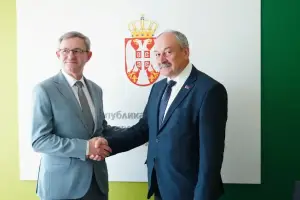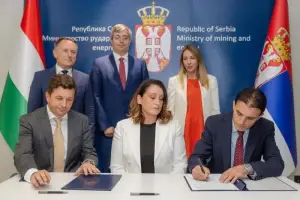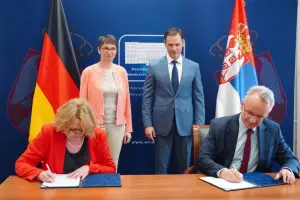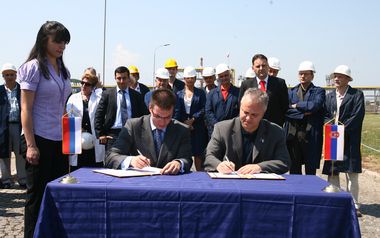- Serbia
Get to know Serbia
- Citizens
Culture and science
Health services
Pension and disability insurance
- Business
Employment
Economy
- Media
- Government
- Contact
Keep in touch
Contact form
Back
Keepin touch
Whether you have a question, comment, suggestion or any problem in the purview of the government, send us your message and we will try to respond as soon as possible. If your problem is not in our purview, we will forward your message to the relevant institution.
Q:
A:
Strategic partnership with NIS to secure larger export for HIP-Petrohemija
Pancevo,
15 July 2010
Deputy Prime Minister and Minister of Economy and Regional Development Mladjan Dinkic and Director General of the Serbian oil industry Naftna Industrija Srbije (NIS) Kirill Kravchenko signed an Agreement on Long-Term Cooperation between NIS and petrochemical factory HIP-Petrohemija today.
Dinkic stressed that this document guarantees that during the next ten years NIS will deliver primary petrol to HIP-Petrohemija, enabling it to achieve a larger profit and export more products.
The document also envisages mutual delivery of products and services between the two companies, he added.
He explained that NIS is under an obligation to supply HIP-Petrohemija with primary petrol and heavy fuel oil, while in return HIP-Petrohemija will deliver additives for petrol, water vapour and provide wastewater processing services.
The Deputy Prime Minister specified that in line with the Agreement, starting from 1 August NIS will deliver over 12,000 tonnes of primary petrol every month to HIP-Petrohemija. Once NIS puts into operation the new facility for hydroprocessing, the amount will increase to 25,000–40,000 tonnes a month.
Dinkic affirmed that by the end of the year an investment programme for HIP-Petrohemija will be drafted, adding that the time is right for investment in the chemical industry since the prices of these products in the market are rising.
By the end of November an agreement will be reached with unions regarding an increase in the salaries of HIP-Petrohemija employees, the Minister confirmed.
The unemployment trend in Serbia can be reversed with new investment, especially in the car industry, electronics and telecommunications, but also by developing existing capacity.
The Deputy Prime Minister pointed out that the only way to increase employment in a time of crisis is to stimulate spending, and not by belt-tightening.
If demand is poor, you must stimulate spending in order to produce more and in that way increase employment, Dinkic illustrated adding that Serbia’s chemical industry is very perspective.
Kravchenko said that this Agreement is an extension of the cooperation between the two companies, noting that it is not the last step in the development of their cooperation.
HIP-Petrohemija Director Sasa Pavlov declared that the signing of the Agreement is a historic day for the company since it will be a basis for investment activities which will ensure even better deals for the company in times ahead.
Pavlov outlined that in the first half of 2010 Hip –Petrohemija exported goods worth €102 million, recalling that the company exports 75–80% of its products.
The document also envisages mutual delivery of products and services between the two companies, he added.
He explained that NIS is under an obligation to supply HIP-Petrohemija with primary petrol and heavy fuel oil, while in return HIP-Petrohemija will deliver additives for petrol, water vapour and provide wastewater processing services.
The Deputy Prime Minister specified that in line with the Agreement, starting from 1 August NIS will deliver over 12,000 tonnes of primary petrol every month to HIP-Petrohemija. Once NIS puts into operation the new facility for hydroprocessing, the amount will increase to 25,000–40,000 tonnes a month.
Dinkic affirmed that by the end of the year an investment programme for HIP-Petrohemija will be drafted, adding that the time is right for investment in the chemical industry since the prices of these products in the market are rising.
By the end of November an agreement will be reached with unions regarding an increase in the salaries of HIP-Petrohemija employees, the Minister confirmed.
The unemployment trend in Serbia can be reversed with new investment, especially in the car industry, electronics and telecommunications, but also by developing existing capacity.
The Deputy Prime Minister pointed out that the only way to increase employment in a time of crisis is to stimulate spending, and not by belt-tightening.
If demand is poor, you must stimulate spending in order to produce more and in that way increase employment, Dinkic illustrated adding that Serbia’s chemical industry is very perspective.
Kravchenko said that this Agreement is an extension of the cooperation between the two companies, noting that it is not the last step in the development of their cooperation.
HIP-Petrohemija Director Sasa Pavlov declared that the signing of the Agreement is a historic day for the company since it will be a basis for investment activities which will ensure even better deals for the company in times ahead.
Pavlov outlined that in the first half of 2010 Hip –Petrohemija exported goods worth €102 million, recalling that the company exports 75–80% of its products.
-
 Belgrade, 11 July 2025
Belgrade, 11 July 2025Potential for improving cooperation with Belarus in many areas
-
 Požega, 5 July 2025
Požega, 5 July 2025Section of Pakovraće - Požega highway officially opened
-
 Belgrade, 2 July 2025
Belgrade, 2 July 2025Technical specifications defined for Serbia-Hungary oil pipeline
-
 Belgrade, 30 June 2025
Belgrade, 30 June 2025IMF confirms Serbia successfully implementing all agreed reforms
-
 Belgrade, 27 June 2025
Belgrade, 27 June 2025Double Taxation Avoidance Agreement with Germany signed
-
 Kostolac, 25 June 2025
Kostolac, 25 June 2025Construction of Kostolac wind farm nearing completion
-
 Belgrade, 24 June 2025
Belgrade, 24 June 2025Government supports request for new postponement of sanctions against NIS
-
 Belgrade, 23 June 2025
Belgrade, 23 June 2025Procedures to facilitate sale of Serbian products to China to be accelerated
-
 Belgrade, 21 June 2025
Belgrade, 21 June 2025Serbia receives first funds under Growth Plan for the Western Balkans
-
 Belgrade/Cairo, 20 June 2025
Belgrade/Cairo, 20 June 2025New phase in relations with Egypt in field of agriculture


